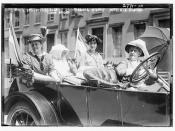Madison Cummings
2/24/14
Rich and Dead
Rich upper-class society has a history of being plagued by stereotypes and assumptions, but in those stereotypes there lies truth. In F. Scott Fitzgerald's novel, The Great Gatsby, West Egg represents the new gaudy wealthy and East Egg represents the old generation wealthy; however, both neighborhoods are filled with unhappy spoiled people obsessed only with their status and wealth. This raises the question: does finally growing up mean the realization of life's realities and abandoning one's carefree youth? Fitzgerald portrays the wealthy as people trying to achieve meaning in their lives when faced with the harsh realities of becoming adults.
Gatsby's lavish parties are vehicles to the main theme in the Great Gatsby: American obsession over wealth. There is, however, a deeper meaning that lies within the partygoers. The parties, to the guests, which most of whom are uninvited, are like theme parks.
For example, when they enter "they conduct themselves according to the rules of behavior associated with an amusement park." (41). The guests see these parties as a way to stay young by throwing away their responsibilities and drinking cocktails from bowl-sized glasses, like how children act at theme parks with reckless abandon. Having been used to a life full of convenience and having everything handed to them, these people are too caught up in trying to avoid the realities adulthood by abusing their wealth and status. As children, there was little ambition for them to have any real dreams or goals in life because they had started out in life with everything they already needed. After the parties end, the girls are drunk and sobbing while the boys argue bitterly with their wives as they drive back home to their mansions in their Rolls-Royces. From...

![[Portrait of Ella Fitzgerald, Dizzy Gillespie, Ray Brown, Milt (Milton) Jackson, and Timmie Rosenkrantz, Downbeat, New York, N.Y., ca. Sept. 1947] (LOC)](https://s.writework.com/uploads/17/177957/portrait-ella-fitzgerald-dizzy-gillespie-ray-brown-milt-mil-thumb.jpg)
